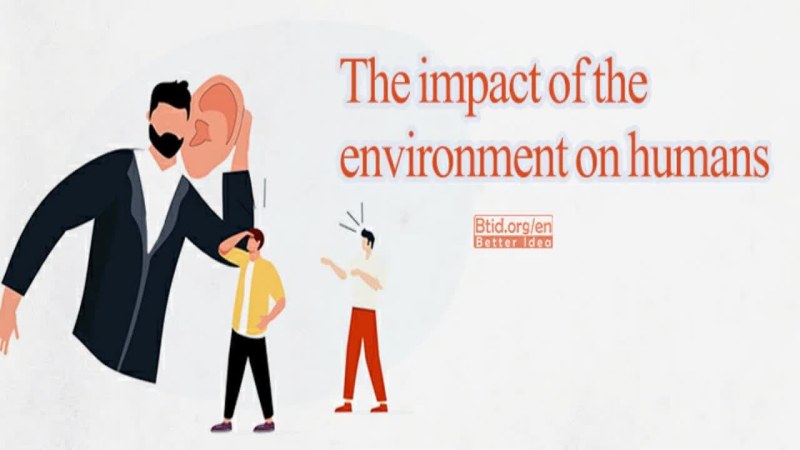- Undoubtedly, the social environment of human life has a great effect on his attitudes and actions. Because man acquires many of his traits from the environment. Clean environments often breed clean people and polluted environments often breed polluted people. It is true that a person can live clean in an impure environment and vice versa.

forbid ding evil and enjoining good, Principles of the obligation
Impact of the environment on humans in the Quran (not to forbid the evil):
The Holy Qur'an, in the form of an allegory, depicts the effect of the environment on human actions and deeds as follows: “As for the good land, its vegetation cometh forth by permission of its Lord; while as for that which is bad, only the useless cometh forth (from it). Thus do We recount the tokens for people who give thanks”.[1]
In this example, humans are compared to plants and their living environment to salty and sweet lands. In a polluted environment, it is difficult to cultivate pure people, even if the teachings are strong and effective, just as the life-giving raindrops never grow in the hyacinth salt marsh. For this reason, great importance should be given to improving the environment in order to ennoble the people and strengthen righteous morals.
According to the above material, the importance of enjoining good and forbidding evil and the reasons for its necessity are well revealed. The Holy Quran considers one of the important philosophies of sending divine prophets to beautify the environment from polytheism and sins. There are many Quranic stories about what efforts each of those prophets made to make the environment of society pure.
The Companions of the Cave were also a clear example of solidarity in a society in which disbelief and polytheism permeated all its arteries. They did not accept silence and sang the song of monotheism with a unified uprising and with one voice. In that polytheistic atmosphere, they suffered from the deviance of their people and their idolatry and could not witness all the intellectual degeneration of the people. Therefore, they said: “These our people have taken gods besides Him; why do they not produce any clear authority in their support? Who is then more unjust than he who forges a lie against Allah?”[2]
If the environment is bad, the next generations who are born and grow up in that environment will be influenced by the environment and will be brought up with the same culture that prevails in the society. In another story, we see that when Prophet Noah (pbuh) cursed his people and asked for divine punishment for them, he accompanied his request with the following reason: “For surely if Thou leave them they will lead astray Thy servants, and will not beget any but immoral, ungrateful (children)”. [3]
If the environment is impure, the problem goes to the point where values become anti-values and anti-values become values. In the story of the Prophet Lot, we see that chastity is considered a crime in that society. To the extent that the people of Lot said: “And his people gave no answer but this: they said, "Drive them out of your city: these are indeed men who want to be clean and pure!”[4]
Conclusion:
According to the above, the importance of enjoining the good and forbid ding the evil and why it is obligatory is clearly revealed. And the other thing is that if we and our future generations want to live in a clean environment so that the fields of guidance and salvation are prepared for us, we should not be uninterested to our environment and in order to make it pure, we must continue to enjoin what is good and forbid what is evil.
[1] Quran [7–58] وَالْبَلَدُ الطَّيِّبُ يَخْرُجُ نَبَاتُهُ بِإِذْنِ رَبِّهِ ۖ وَالَّذِي خَبُثَ لَا يَخْرُجُ إِلَّا نَكِدًا ۚ كَذَٰلِكَ نُصَرِّفُ الْآيَاتِ لِقَوْمٍ يَشْكُرُونَ
[2] Quran [18–15] هَٰؤُلَاءِ قَوْمُنَا اتَّخَذُوا مِنْ دُونِهِ آلِهَةً ۖ لَوْلَا يَأْتُونَ عَلَيْهِمْ بِسُلْطَانٍ بَيِّنٍ ۖ فَمَنْ أَظْلَمُ مِمَّنِ افْتَرَىٰ عَلَى اللَّهِ كَذِبًا
[3] Quran [71–27] إِنَّكَ إِنْ تَذَرْهُمْ يُضِلُّوا عِبَادَكَ وَلَا يَلِدُوا إِلَّا فَاجِرًا كَفَّارًا
[4] Quran [7–82] وَمَا كَانَ جَوَابَ قَوْمِهِ إِلَّا أَنْ قَالُوا أَخْرِجُوهُمْ مِنْ قَرْيَتِكُمْ ۖ إِنَّهُمْ أُنَاسٌ يَتَطَهَّرُونَ



